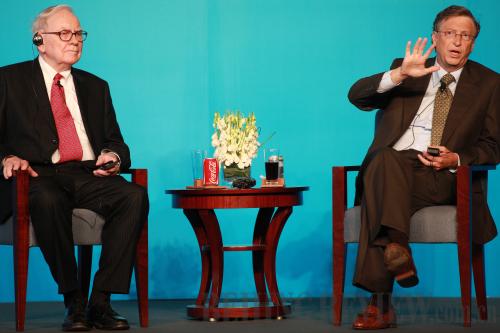|
 |
|
BE GENEROUS: World's two richest men, Warren Buffett (left) and Bill Gates, meet the press before a charity banquet in Beijing on September 30, 2010 (CFP) |
China's latest wave of major philanthropists are not just donating their money, they're requiring charity funds be used in a more efficient way according to blueprints they've set out themselves. While a bit demanding, the requirements aren't meant to hurt charities or those in need, but rather to prevent their funds from going to the wrong hands.
In the most recent case of corruption-averting philanthropy, Cao Dewang, Board Chairman of the Fuyao Glass Group in Fujian Province, wanted greater verification from the commissioned charitable organization that his money was being properly spent.
Rigid rules
Last May, Cao donated 200 million yuan ($30.49 million) to the China Foundation for Poverty Alleviation (CFPA) to help impoverished poor farmers in five provinces and municipalities in southwest China. It marked the largest single private donation in China's philanthropic history.
The donation attracted attention because the donor set a series of strict conditions to ensure his money was given to the right people in right places. Cao required the CFPA to distribute the money to eligible recipients within six months. He also wanted the error rate, the number of donations given to people who did not meet Cao's criteria, to not exceed 1 percent. The administrative cost would also be limited to 3 percent of the total donation amount.
The CFPA found it difficult to meet these requirements, since the foundation's regular measures for management state the highest administrative cost could reach 10 percent of the donation amount.
"Cao's offer was really quite low compared to what we're used to, but it was a test of our abilities and a challenge to meet the requirements that we took head on," said Chen Hongtao, Assistant Secretary General of the CFPA.
Chen also said, after meeting with Cao, CFPA leaders were hesitant to accept the donation because they weren't sure if they could meet Cao's rigid requirements. An agreement was finally reached and the CFPA managed the donation process in accord with Cao's specific requirements.
The administrative fee for the project was set at 6 million yuan ($915,000), just 3 percent of the total donation amount.
Cao said he knew the normal percentage of the administrative fee to the total donation amount of the CFPA's projects was 10 percent and he didn't set the ratio of 3 percent to deliberately make things difficult.
Cao consulted a professional agency about administrative costs before making the donation to get an idea of what kind of requirements to set. He said the agency said 6 million yuan should be fine.
Nonetheless, the media tagged Cao as "the most demanding donor" in China's philanthropic history.
Cao downplays the title. "I don't think 3 percent is too low. Don't they have ways of managing it?" he said.
Cao said the agreement didn't mean he doesn't trust the foundation. "The agreement functions as a constraint for the CFPA and the local governments. No money will be taken away or given to the wrong people; all money will go to the needy," he said.
In the agreement, Cao specified any loss during the distribution process would be intolerable. He established an expert panel to oversee the use of his donation. A commissioned monitoring agency sampled 10 percent of beneficiary families randomly after the donation was given out. If more than 1 percent of the families were found to be unqualified, the CFPA would have to pay back the fund at 30 times the amount misspent.
"The most demanding donor indeed brought unprecedented challenges to the CFPA, the largest of which was targeting qualified recipients to stay under the 1-percent error rate threshold," said Chen with the CFPA.
With this part of the process completed, the next step was delivering the money. In many previous cases, this link was found to be vulnerable to corruption, as the donation amount often shrank by the time it reached the hands of the recipients. To avoid this, the CFPA decided to transfer the money directly to recipients' bank accounts so there were no loopholes or opportunities for corruption.
By February, the 200 million yuan donated by Cao had been handed out as scheduled. Cao said it proved he had done the right thing to have an agreement about distribution.
According to an assessment report, a total of 92,150 farmers received 2,000 yuan ($305) each from Cao's donation. The error rate is 0.85 percent.
A good example
"Cao's personal demand to the CFPA actually pushed the organization to improve its operation," said Cheng Chuanjin, a professor at the Research Center of Philanthropy and Social Enterprise of Beijing Normal University.
"We took the job to let the public know that we are a trustworthy organization," said CFPA Secretary General Wang Xingzui.
He Daofeng, Vice President of the CFPA, said Cao set a good example and had made China's charity donations more accountable and transparent.
"The success of the project suggests there is room for the reduction in administrative expenses of public foundations," said Deng Guosheng, Deputy Director of the Nongovernmental Organization Research Center at Tsinghua University.
Many foundations in China reportedly are following the regulated 10 percent as the highest standard of the administrative fee ratio. But Deng believes this standard is unreasonable as foundations vary in size and have different administrative costs.
"Some large public foundations, which raise more than $1 billion each year and also have the government's financial support, could have lower operating costs," Deng said. "But for smaller foundations, 10 percent of the administrative fee ratio may not be enough."
| 